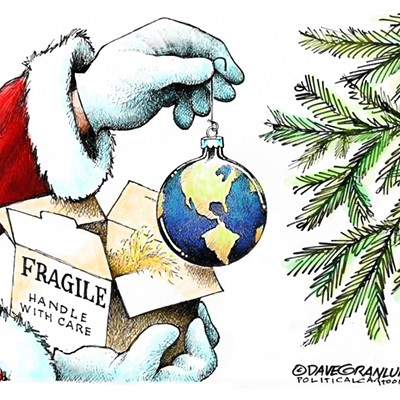Since last September, our country has done a credible job of searching out those responsible for the attacks. We may not have caught Osama and his band of murderous chiefs, but for now we have obviously disrupted their organization.
The government also seems to have made inroads into cutting down the flow of funds to al-Qaida. With less money, it should be less of a threat.
But on two fronts the United States has opened itself up for more terrorist actions in the future. Unfortunately, both of these are issues we can do something about but chose to ignore.
The first: Our "we're better than you because God has blessed America" national attitude. Its corollary is "everybody should feel terribly sorry because 3,000 of us were senselessly killed in one day."
That horrific act didn't translate into sympathy for the United States in much of the world. Centuries of genocide, tribal hatreds, political dictatorships and ethnic cleansing have left a lot of people numb to one more act of terrorism. Our role as the globe's bully cop hasn't helped.
As a middle-class, well-educated Jordanian said last fall of our unflinching support for Israel, "I think maybe 95 percent of Arabs are not sorry for what happened in the United States. There are 1.5 billion Muslims and 15 millions Jews, yet they have us under their feet."
"Then your President says [the war against terrorism] is a crusade," he added. "Why did he use that word? Does he mean a crusade against Muslims?"
A reasonable question to ask in a part of the world that has seen centuries of outside intervention. But most Americans, including President Bush, probably would have no clue why using the term "crusade" in the Middle East would be similar to a Muslim calling for "jihad" against the United States.
Some blame this world perception on envy of America. But while many people may wish for our economic opportunities and personal freedoms, they don't treasure our obsessions with sex, sports, celebrity and violence. Most prefer their own, family-oriented lifestyles.
That is one reason why, as a report from the Council on Foreign Affairs recently stated, "Around the world, from Western Europe to the Far East, many see the United States as arrogant, hypocritical, self-absorbed, self-indulgent and contemptuous of others."
All true, of course, but our government's response was to say we just needed to do a better public relations job in selling America. That simply won't work. Too many people in foreign lands see the United States as providing military support to dictators, inflicting economic repression and of being their great oppressor. Some of them have decided to seek revenge, and terrorism is the response.
We're also seen as two-faced in the extreme. We proclaim a love of democracy, but would Pakistan's dictator Pervez Musharraf be the darling of the administration if he wasn't on "our team?"
We also profess to be fair and even-handed in our dealings with others. But while nuclear-armed, baby-killing communist China occupies Tibet, it is Muslim Iraq at the center of the Pentagon's bulls-eye. President Bush believes Iraqi weapons of mass destruction are a threat to us as a nation, but can't say how.
Which leads to the second major problem facing us. In the short term we have stopped al-Qaida, but at the same time laid the groundwork for it or similar groups to add more recruits.
Millions of people around the globe look at our foreign policy and think "something's got to be done about that." Thankfully, most of them won't turn to terrorism, but in frustration a increasing number of them possibly will. If that happens, the result will be a growing army of militants willing to strike a blow at America and its citizens.
Certainly our enormous military might will strike back. But as September 11 showed, the power of a box cutter can sometimes be as mighty as that of a missile.
Working to our disadvantage is our lack of patience. Unlike us, it is not uncommon in other countries to find people who hold grudges against their neighbors for atrocities that occurred decades, or even centuries, ago.
Since last September, terrorism against Americans has mostly been contained. But our country's lack of understanding the background of those attacks has left us even more vulnerable in the future. Most of us don't want to consider the world's complexities. We'd prefer to simply see things as "good" vs. "evil."
Terrorism may disappear for awhile, but like the roots of ragweed, it will not die. It will linger and wait for its opportunity, especially as long as many people around the globe have given up the hope for a better future and blame the United States for that.










